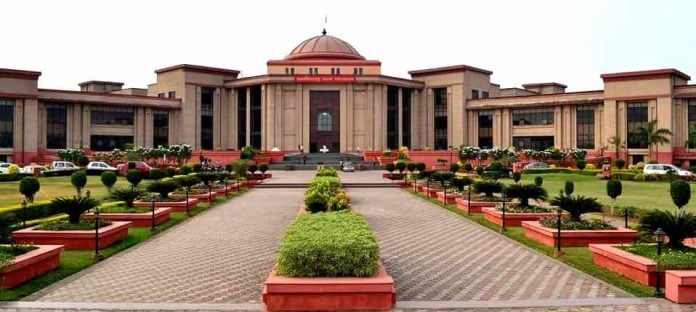The Chhattisgarh High Court dismissed a Public Interest Litigation (PIL) filed seeking direction to the respondent authorities to make provision for reservation of the students of SC/ST category in all the 380 Atmanand Schools run by Government within stipulated time as the admission process for new academic session 2023-24 has been started since April.2023.
Nasimuddin Ansari, Counsel for the petitioner submits that the Government of Chhattisgarh is running as many as 380 Swami Atmanand Excellent Hindi and English Medium Schools in the entire State for the academic session 2023-2024. However, the respondent authorities, despite the rights as enshrined under Articles 15(4 and 5) of the Constitution of India, are depriving the students belonging to the Scheduled Caste and Scheduled Tribes categories from admission in these Atmanand Schools. No provision for reservation of SC/ST students have been made for admission in the Swami Atmanand Excellent Schools of the Districts for the academic session 2023-2024. The petitioner, who is the State Secretary of the Chhattisgarh SC/ST Officers & Employees Association, has made a representation to the Hon’ble Chief Minister of the State, but of no avail.
On the other hand, Gagan Tiwari, Deputy Government Advocate appearing for the State/respondents submits that this petition is not maintainable as the petitioner has not specified under which provision of any Act/Rules, reservation for admission is to be granted in the Schools. The petition also lacks substance and deserves to be dismissed at the threshold.
Having considered the rival submissions of the counsel for the parties and gone through the record, the Division Bench of Chief Justice Ramesh Sinha and Justice Rajani Dubey held that it is the duty of the Court to ensure that there is no personal gain, private motive and oblique notice behind filing of PIL. In order to preserve the purity and sanctity of the PIL, the Courts must encourage genuine and bonafide PIL and effectively discourage and curb the PIL filed for extraneous considerations.
The Courts should, prima facie, verify the credentials of the petitioner before entertaining a PIL. It is also well settled that the Courts before entertaining the PIL should ensure that the PIL is aimed at redressal of genuine public harm or public injury. The Courts should ensure the jurisdiction in public interest is invoked for genuine purposes by persons who have bona fide credentials and who do not seek to espouse or pursue any extraneous object. Otherwise, the jurisdiction in public interest can become a source of misuse by private persons seeking to pursue their own vested interests.
The Court vide order dated 25.05.2023 had directed the petitioner to specify and file the details of students, who have not been admitted in Atmanand Schools. When a specific query was made to the counsel for the petitioner as to who are the students who have been denied admission for whatsoever reasons, learned counsel has not been able to make any submission nor has supplied any information as sought for by this Court.
The petitioner has not bothered to answer the query made by the Court. Even the facts and pleadings in the petition appears to be vague as the petitioner has not been able to point out violation of any Rules/Acts/Regulations which is causing any deprivation to the students belonging to the SC/ST categories of being admitted in the Atmanand Schools. Even the petitioner has not been able to point out any flaw in the instructions issued on 05.04.2023 by the Directorate of Public Instructions, except for making a statement that no provision for reservation has been made. Though there may not be any provision for reservation in the Atmanand Schools, but even in absence of any reservation, any candidate who fulfills the requisite norms, may apply for admission in these schools. Not a single instance of rejection of any application of any candidate belonging to the SC/ST community has been pointed out and as such, the petition itself appears to be vague and sketchy, hence, no relief as prayed for by counsel for the petitioner can be granted , observed the Court.


